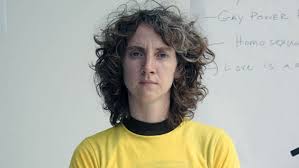Through her performances, films, and installations, Sharon Hayes examines the intersection of history, politics, and speech, with a particular focus on the language of twentieth-century protest groups. Parole, the title of this installation, refers to the term used by Swiss linguist Ferdinand de Saussure to distinguish individual acts of speech (parole) from a larger system of language (langue). In this installation, several distinct scenes present examples of public speech in different contexts. In each of the settings, which include Hayes’s recent performances as well as fictive scenes without an audience, the same figure appears, recording sound but never speaking. Hayes draws on historical texts—such as early lesbian activist Anna Rüling’s 1904 speech.
What Interest Does the Women’s Movement Have in the Homosexual Question—that “re-speak” to new audiences. These historical speeches, and Hayes’s work in general, explore the construction of gender and sexuality and the articulations of political protest, revealing unexpected resonances across time periods. Parole encourages the viewer to think about how past forms of protest can inform the present and how the effects of public speech are altered in the process of documentation.
